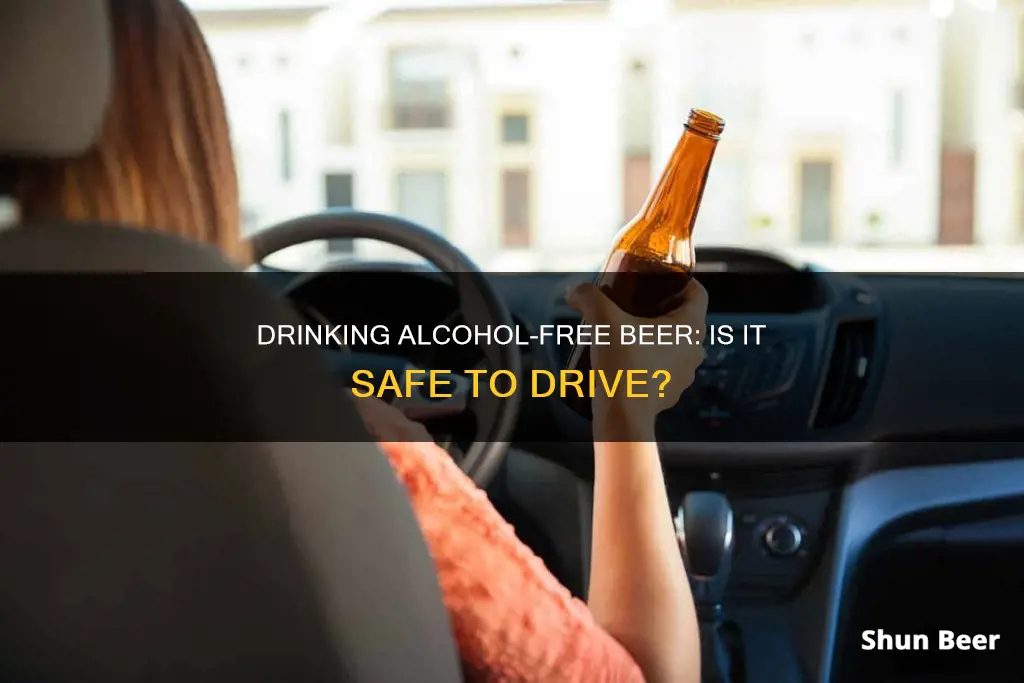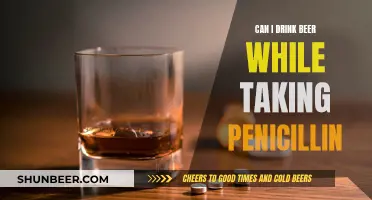
Drinking and driving is a serious offence that can have life-changing consequences. While it may be tempting to get behind the wheel after consuming an alcohol-free beer, it's important to understand the risks and legal implications. Alcohol-free beers typically contain less than 0.5% alcohol by volume (ABV), but does that mean it's safe to drive? In this discussion, we will explore the considerations and implications of drinking these beverages before driving and provide insights into the laws and safety concerns surrounding this topic.
| Characteristics | Values |
|---|---|
| Legality of drinking alcohol-free beer and driving | Generally legal and safe, but laws vary by country and jurisdiction |
| Blood alcohol concentration (BAC) impact | Unlikely to significantly impact BAC due to low alcohol content |
| Open container laws | May be pulled over due to suspicion of having an open container, but no legal consequences if drink is non-alcoholic |
| Perception and misunderstanding | May be perceived negatively by law enforcement, friends, or family; clear communication or consumption in a way that minimises confusion is advised |
| Individual sensitivities | Some individuals may have sensitivities or allergies to ingredients like gluten, hops, or yeast |
| Intoxication | Intoxication is highly unlikely due to low alcohol content |
What You'll Learn

Legality of alcohol-free beer while driving
Drinking alcohol and driving is illegal and can have serious consequences. But what about alcohol-free beer? Can you legally drink a non-alcoholic beer and then get behind the wheel? Let's explore the considerations and implications of drinking alcohol-free beer and driving.
Understanding Alcohol-Free Beer
Alcohol-free beer, also known as non-alcoholic beer, is typically defined as having less than 0.5% alcohol by volume (ABV). This means that it contains very little to no alcohol, and it is unlikely to cause intoxication or impair one's ability to drive. However, it's important to note that some alcohol-free beers may still contain trace amounts of alcohol.
Legality of Drinking Alcohol-Free Beer and Driving
The legality of drinking alcohol-free beer and driving varies by country and jurisdiction. In most places, the focus is on the driver's blood alcohol concentration (BAC) rather than the specific type of beverage consumed. Given the low alcohol content of alcohol-free beer, it is unlikely to significantly impact one's BAC. As a result, drinking alcohol-free beer and driving is generally legal and should not lead to legal consequences related to impaired driving.
However, it is important to be aware of local laws and regulations. For example, in the United Kingdom, the drink-drive limit in England and Wales is 80 milligrammes of alcohol per 100 millilitres of blood, while Scotland has a lower limit of 50 milligrammes per 100 millilitres. Always check the specific regulations in your area before making a decision.
Safety Considerations
While alcohol-free beer is generally legal to consume while driving, there are still some safety aspects to consider. Firstly, individuals should always assess their own level of alertness and comfort before getting behind the wheel, even if they believe the drink has not affected them.
Additionally, it is important to be mindful of how others may perceive this behaviour. Law enforcement officers, friends, or family members may not immediately recognise that the beverage is alcohol-free, which could lead to misunderstandings. To avoid confusion, individuals may choose to clearly communicate that they are drinking alcohol-free beer or consume the beverage in a way that minimises ambiguity.
Furthermore, some individuals may have sensitivities or allergies to ingredients in alcohol-free beer, such as gluten, hops, or yeast. It is crucial to be aware of personal dietary restrictions and choose beverages accordingly.
In conclusion, while it is generally legal to drink alcohol-free beer and drive in many places, it is important to stay informed about local laws, be mindful of safety considerations, and make informed choices to ensure the well-being of oneself and others on the road.
Light Beer: Friend or Foe of Your Diet?
You may want to see also

Blood alcohol concentration (BAC) limits
In the United States, the legal BAC limit for driving is 0.08%. This means that if your BAC exceeds this level, you are presumed to be intoxicated and can be charged with driving under the influence (DUI). However, it's important to note that DUI charges can still be applied even if your BAC is below the legal limit, depending on your behaviour on the road.
Some states have implemented zero tolerance laws, which set much lower BAC limits for specific groups such as teenage drivers and commercial drivers. These limits can be as low as 0.04% or even lower.
In the United Kingdom, the legal BAC limit for driving is also 0.08%. While drinking alcohol-free beer is generally considered safe and legal, it is important to be cautious and aware of how others may perceive this behaviour. Law enforcement officers may still pull you over if they suspect you of drinking an alcoholic beverage, and you could be charged with an open container violation.
It is always important to check the local laws and regulations regarding BAC limits and drinking and driving. The consequences of drinking and driving can be severe, including driving bans, fines, and even imprisonment.
Mixing Beer and Cough Syrup: What You Should Know
You may want to see also

Open container laws
In the context of public places, "public places" refer to openly public places such as sidewalks, parks, and vehicles, but do not include nominally private spaces that are open to the public, such as bars, restaurants, and stadiums.
When it comes to vehicles, open container laws ban the presence of any unsealed container carrying an alcoholic beverage in areas that are readily accessible to vehicle occupants, such as the passenger area. This includes all types of containers holding alcoholic beverages, such as cans, bottles, or flasks. However, open containers are generally allowed in the trunk, locked glove compartment, or other unreachable spaces from the passenger area. Additionally, open container laws do not apply to certain types of vehicles, such as taxis, limousines, and the living quarters of motor homes, campers, or recreational vehicles.
The penalties for violating open container laws vary by state but can include fines, jail sentences, or the loss of driving privileges. As of 2022, 38 states and Washington, D.C., have laws that comply with federal legislation regarding open container laws.
Beer and Fruit: A Refreshing Combination?
You may want to see also

Individual sensitivities to alcohol-free beer ingredients
Alcohol-free beer is unlikely to cause impairment or affect one's ability to drive safely. However, individual sensitivities and allergies to ingredients in alcohol-free beer should be considered. Some people may experience adverse reactions to ingredients such as gluten, hops, yeast, or other additives. Here are some key points to consider regarding individual sensitivities to alcohol-free beer ingredients:
- Gluten Sensitivity: Gluten is a protein found in grains like wheat, barley, and rye. Some individuals with gluten intolerance or coeliac disease may experience digestive issues such as diarrhoea, bloating, or discomfort after consuming gluten-containing products, including certain alcohol-free beers.
- Hops Intolerance: Hops are a common ingredient in beer and can cause allergic reactions in some individuals. Symptoms may include itching, hives, sneezing, coughing, or digestive issues.
- Yeast Sensitivity: Yeast is used in the brewing process, and some people may have sensitivities or allergies to specific types of yeast. Reactions can vary but typically include digestive issues or skin irritations.
- Additives and Preservatives: Alcohol-free beers may contain additives, preservatives, or artificial sweeteners that some people are sensitive to. These can trigger allergic reactions or digestive discomfort.
- Histamines: Histamines are naturally produced during the brewing and fermentation process. Some individuals may be sensitive to histamines and experience allergic-like symptoms such as flushing, hives, or respiratory issues.
- Carbonation: Alcohol-free beers can be highly carbonated, and some people may find that the carbonation level contributes to digestive discomfort or bloating.
It is important to note that individual sensitivities can vary, and not everyone will experience the same reactions to these ingredients. However, if you have known allergies or sensitivities, it is advisable to check the ingredients list and choose alcohol-free beers that align with your dietary needs and restrictions. Additionally, always listen to your body and consult a healthcare professional if you experience adverse reactions or persistent symptoms.
Drinking Beer With Amoxicillin: What You Need to Know
You may want to see also

Perception of drinking alcohol-free beer while driving
Drinking alcohol-free beer while driving is generally considered safe and legal in most places. Alcohol-free beer typically contains less than 0.5% alcohol by volume (ABV), which is below the threshold for being considered alcoholic. This means that drinking these beverages is unlikely to cause intoxication or impair one's ability to drive safely. However, it is important to note that laws regarding drinking and driving vary by country and jurisdiction, and individuals should always assess their own level of alertness before getting behind the wheel.
One key consideration when drinking alcohol-free beer while driving is the perception and misunderstanding of others. Law enforcement officers, for example, may not immediately recognise that the beverage being consumed is alcohol-free, and individuals may be pulled over or questioned due to suspicion of an open container violation or driving under the influence. To avoid such misunderstandings, it is advisable to communicate clearly that the beverage is alcohol-free or to consume it in a way that minimises confusion.
Additionally, individual sensitivities to ingredients in alcohol-free beer, such as gluten, hops, or yeast, should be taken into account. Although rare, some people may experience allergies or adverse reactions to these ingredients. It is crucial for individuals to be aware of their own dietary needs and choose beverages accordingly.
While drinking alcohol-free beer while driving may not result in legal consequences or impairment, it is always advisable to prioritise safety. If individuals feel their alertness or ability to drive is compromised, it is best to refrain from driving and find alternative transportation.
In conclusion, the perception of drinking alcohol-free beer while driving varies. While it is generally safe and legal, there may be misunderstandings or concerns from law enforcement or others. Individuals should use their best judgement, be mindful of their own sensitivities and alertness, and always follow local laws and regulations to ensure a safe driving experience for themselves and others.
Beer and GERD: What You Need to Know
You may want to see also
Frequently asked questions
Yes, it is legal to drink alcohol-free beer and drive in most places. Alcohol-free beer typically contains less than 0.5% alcohol by volume (ABV), which means it is unlikely to cause intoxication or impair your ability to drive safely. However, laws vary depending on where you are, so always check local regulations.
While it is generally safe and legal, drinking alcohol-free beer before driving can lead to misunderstandings with law enforcement, friends, or family who may not realise the drink is alcohol-free. It is also important to consider individual sensitivities and allergies to ingredients such as gluten, hops, or yeast.
Yes, drinking alcohol-free beer while driving can still result in being lawfully pulled over by law enforcement due to the suspicion of having an open container and potentially driving under the influence. Once the drink is confirmed to be non-alcoholic, you would likely be released unless other circumstances arise.
Alcohol-free beer is highly unlikely to cause impairment or affect your ability to drive safely due to its low alcohol content. However, it is important to always assess your own level of alertness and comfort before getting behind the wheel.
Yes, there are several alternatives to alcohol-free beer that you can enjoy before driving, including non-alcoholic wine, mocktails, and soft drinks. These options provide a similar experience without the risk of intoxication or legal consequences.







